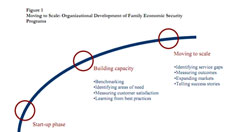INITIATIVE DESCRIPTION
In an effort to combat poverty, the Earned Income Tax Credit (EITC) provides tax refunds to low- and moderate-income workers limited by implications of income tax on earnings. Unfortunately, a large number of families able to qualify for EITC benefits are unaware, leaving millions of aid dollars untapped. To address this, Knight-funded organizations, through free tax preparation, as well as other family economic security programs, operated 118 tax-preparation sites and generated $22 million in federal tax refunds in 2005 to the working poor in eight communities: Akron, Ohio; Biloxi, Miss.; Detroit, Mich.; Gary, Ind.; Miami, Fla.; Palm Beach County, Fla.; San Jose, Calif.; and Tallahassee, Fla.
ASSESSMENT PURPOSE & APPROACH
Key Questions
- How were identified service-delivery barriers addressed?
- How much did participation rates grow from 2005 to 2006?
- Where do Knight EITC programs stand nationally?
- How well are EITC recipients being linked to other economic stabilization programs?
- How supportive of family economic security programs are local and state policies?
Approach: Insights in this evaluation were obtained through on-site visits and follow-ups with Knight-funded organizations involved with the EITC campaign.
Assessment Partners: This report was produced by Kimary Lee and Nik Theodore, of the University of Chicago Center for Urban Economic Development.
This report was produced by Kimary Lee and Nik Theodore, of the University of Chicago Center for Urban Economic Development, for Knight Foundation.
PROJECT FINDINGS
- Participation Rates in Relation to 2005 and Other EITC Campaigns – Though all programs met standard increases in participation rates, they ranged in stages of development from start-ups to expansion. In 2005, United Way of Palm Beach County had the only Knight EITC program ranked in the top 15 nationally at No. 13.
- Economic Stabilization Programs – Knight-funded EITC campaigns are typically linked to programs offered through campaign partners serving as intervention points between those organizations and potential beneficiaries. Links include banks, consumer credit service agencies, community colleges and community development corporations.
- Interaction with Greater EITC Movement – In addition to being connected through research, training and policy activities of larger institutions like the Brookings Institute and the Center for Economic Progress, Knight-funded EITC campaigns have contact through conferences, seminars and other shared affiliations.
- Support Provided by State and Local Policies – Despite generally favorable policies, government policies, especially local policies, are missing opportunities to stimulate income and spending by more actively supporting EITC programs.
- Impact – Smaller programs need more support to increase their outreach to families and potential partners. Large programs are poised to explore new services and delivery models. Following years of development, many Knight-funded programs are in a position to have a broader impact on families and policy.
